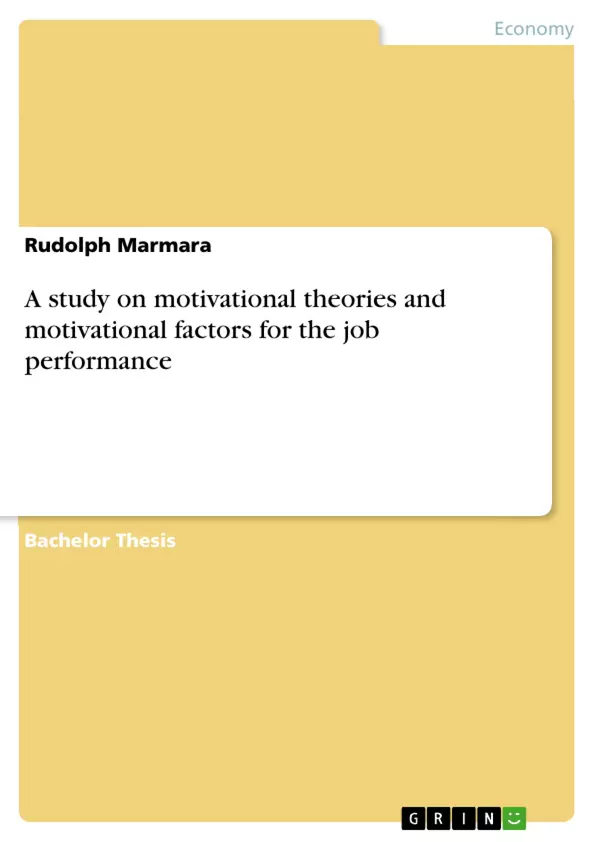Motivation is an important research area for academics and practice area for managers. Various theories, approaches and concepts were developed to describe different forms of motivation. Today it is widely accepted that motivation is very important for managers since it is a way that leads to better work performance.
This study investigates and ranks in order of importance the motivational factors that enhance motivation in the Maltese Courts of Justice (MCOJ). Moreover, it evaluates the impact of motivation on its employees’ work performance. Both qualitative and quantitative techniques were used to collect and analyse information for this research. The data was collected from a sample of 30 employees and another sample of the MCOJ Managers. Later the responses are analysed with different methods and presented in different formats. This study compares the findings with literature and provides areas for discussions. The result is that MCOJ employees are motivated by different factors but the most influential are trust, recognition/ praise and interpersonal relationships.
The impact of motivation on job performance is presented from two different perspectives: the management and the employees. These results are compared to each other where differences in opinion are revealed.
At the end of the paper, the conclusion sums up all the findings and various recommendations to be implemented by the organisation are presented. Finally, the author recommends different areas where this research study can be used so that future research may reveal a better understanding of the concept of motivation and job performance.
Table of Contents
- Abstract
- Dedication
- Acknowledgement
- Chapter 1: Introduction
- 1.1. The Importance of Motivation
- 1.2. Definition of Motivation
- 1.3. Key Motivational Theories
- 1.4. Research Questions
- 1.5. Aims and Objectives of the Research
- 1.6. Methodology
- Chapter 2: Literature Review
- 2.1. Motivation: Definition, Theories and Frameworks
- 2.1.1. Content Theories of Motivation
- Maslow’s Hierarchy of Needs
- Herzberg’s Two-Factor Theory
- Alderfer’s ERG Theory
- McClelland’s Achievement Motivation Theory
- 2.1.2. Process Theories of Motivation
- Vroom’s Expectancy Theory
- Adams’ Equity Theory
- Locke’s Goal Setting Theory
- Bandura’s Social Cognitive Theory
- 2.2. Motivation in the Workplace
- 2.2.1. Factors Affecting Employee Motivation
- 2.2.2. The Relationship between Motivation and Job Performance
- Chapter 3: Research Methodology
- 3.1. Research Design
- 3.2. Research Approach
- 3.3. Data Collection Methods
- 3.4. Data Analysis Techniques
- 3.5. Ethical Considerations
- Chapter 4: Data Analysis and Findings
- 4.1. Demographic Profile of the Participants
- 4.2. Motivational Factors Influencing Employees at the MCOJ
- 4.2.1. Qualitative Analysis of Interviews
- 4.2.2. Quantitative Analysis of Survey Data
- 4.3. Impact of Motivation on Job Performance
- 4.3.1. Perspectives of Managers
- 4.3.2. Perspectives of Employees
- Chapter 5: Discussion of Findings
- 5.1. Comparison of Findings with Literature
- 5.2. Key Findings and Implications
- 5.3. Limitations of the Study
- 5.4. Suggestions for Future Research
Objectives and Key Themes
This dissertation aims to investigate and rank the most important motivational factors that influence employees in the Maltese Courts of Justice (MCOJ), and to evaluate the impact of these factors on job performance. The research employs both qualitative and quantitative methods to gather and analyze data from employees and managers.- The importance of motivation in the workplace.
- Different theoretical perspectives on motivation.
- Identifying key motivational factors within the Maltese Courts of Justice.
- Assessing the impact of motivation on employee job performance.
- Drawing implications for improving employee motivation and performance in the MCOJ.
Chapter Summaries
- Chapter 1 introduces the concept of motivation and its importance in the workplace. It defines motivation, presents key motivational theories, and outlines the research questions, aims, and methodology of the study.
- Chapter 2 provides a comprehensive review of literature on motivation, exploring various theories and frameworks. It focuses on both content and process theories of motivation, and examines the link between motivation and job performance.
- Chapter 3 details the research methodology employed in the study, including the research design, approach, data collection methods, analysis techniques, and ethical considerations.
- Chapter 4 presents the findings of the study, analyzing data gathered from employee surveys and interviews. It explores the demographic profile of participants, identifies key motivational factors within the MCOJ, and assesses the impact of motivation on job performance.
- Chapter 5 discusses the findings of the study in relation to existing literature, highlighting key findings and implications. It also addresses limitations of the study and suggests areas for future research.
Keywords
The dissertation focuses on the key concepts of motivation, job performance, and the Maltese Courts of Justice. It explores various theoretical perspectives on motivation, including content and process theories, and analyzes the impact of specific motivational factors on employee performance. The research also identifies key themes such as trust, recognition, interpersonal relationships, and employee engagement. These keywords encapsulate the primary themes and concepts of the dissertation.Frequently Asked Questions
What are the most important motivational factors for employees at the MCOJ?
The study identifies trust, recognition/praise, and interpersonal relationships as the most influential factors for employees at the Maltese Courts of Justice.
What is the difference between content and process theories of motivation?
Content theories (like Maslow or Herzberg) focus on "what" motivates people, while process theories (like Vroom or Adams) focus on "how" motivation occurs.
Does motivation directly impact job performance?
Yes, the research evaluates this impact from both management and employee perspectives, revealing that higher motivation leads to better work results.
What methodologies were used in this motivation study?
The study used a mix of qualitative (interviews) and quantitative (surveys) techniques to gather data from 30 employees and managers.
What is Adams' Equity Theory?
It is a process theory reviewed in the paper that suggests employees are motivated when they perceive the ratio of their inputs to outcomes as fair compared to others.
- Quote paper
- Rudolph Marmara (Author), 2017, A study on motivational theories and motivational factors for the job performance, Munich, GRIN Verlag, https://www.grin.com/document/441038



